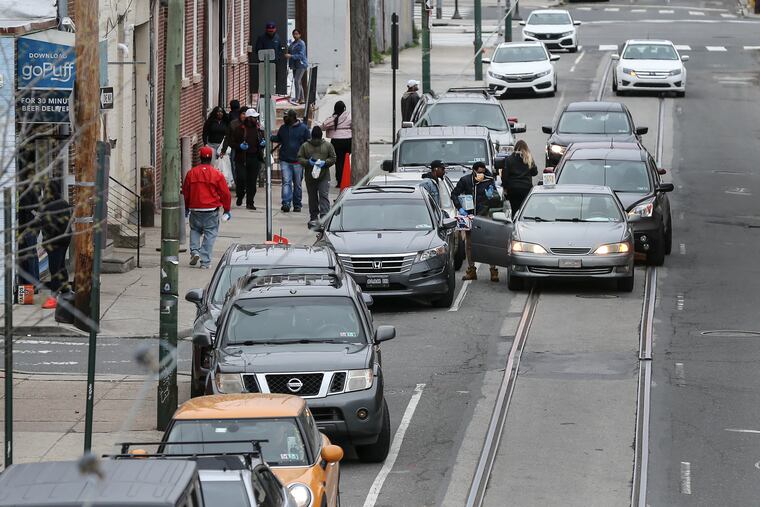goPuff boosts sales, crowds neighbors as coronavirus orders surge
goPuff is so busy the added traffic at some of its neighborhood hubs is annoying residents, who complain about discarded gloves, surly drivers, and trucks blocking roads and sidewalks.

Business is way down and workers are going unpaid at Uber, Lyft, car rentals, and taxi services while the coronavirus lockdown has shut down the world.
But goPuff, the Philadelphia-based delivery service, is busier than ever, seeking thousands of new drivers and warehouse workers at its 170 so-called neighborhood centers across the U.S. It’s all to fill rising orders for La Colombe coffee, Federal Donuts, beer, cleaning agents, over-the-counter drugs, groceries, and baby products for a service charge of $1.95 plus tip per trip.
Like UPS or Amazon, goPuff provides “essential services.” Customers can pay by app and pick up bagged goPuff items left on the doorstep; there is an online payment option. So “social distancing” doesn’t look like a disabling problem.
But this ray of light for Philly business in this bleak April of slowing sales and mass unemployment is feeding another set of problems for neighbors of one of goPuff’s oldest centers, on the 400 block of North 12th Street between Hamilton and Buttonwood, an increasingly residential area near the new city “rail park.”
Residents over the past two years have posted hundreds of pictures on social media (@PHLSafeStreets), showing what they say are goPuff’s inbound truckers and outbound delivery drivers parked illegally, blocking sidewalks and traffic, forcing residents into the street; and of drivers congregating outside their doors, eating and smoking day and night.
And lately they say the traffic has continued into daytime hours despite social distancing guidelines.
Since late March residents have also been pointing out piles of bright blue gloves and other protective equipment, discarded by people leaving the goPuff complex, despite the company’s efforts to collect trash around the site.
A spokesperson would not comment.
Neighbors held a virtual meeting Thursday with a goPuff delegation led by corporate affairs chief Doug Bailey.
City Councilman Mark Squilla, who has been trying to broker peace between goPuff and its neighbors since soon after the center opened in 2017, and Police Capt. Matthew James of the department’s Sixth District also attended.
According to participants, James said that the department had received well over a hundred calls about issues on the block since goPuff opened, and noted the drain on public resources. A city spokesperson had no comment.
It was the latest, residents said, in a string of meetings. “Two and a half years ago they admitted they had outgrown that warehouse. But [on Thursday] they said they can’t commit to moving, they can’t give us a timetable,” said Callowhill Neighborhood Association president Sarah McEneaney.
Citizens who attended told me Squilla has pledged to oblige goPuff to move the center if it can’t improve conditions. McEneaney and others said Squilla had renewed that promise Thursday.
But Squilla aide Anne Kelly, asked to confirm his position, would only say that “goPuff will be working on some remedies to address the community concerns discussed in the meeting.”
Citizens also said goPuff’s Bailey promised to share by this weekend new proposals to remedy a string of problems: health issues posed by the discarded rubber gloves and lack of social distancing by drivers, along with new limits for truck and tractor-trailer deliveries, driver parking, and what neighbors call threatening behavior toward passersby.
GoPuff customers pay by smartphone app; the company has stopped accepting cash to reduce the risk of virus transmission, and says it has added a “distance scanning” ID option to avoid having to show drivers’ licenses when buying beer.
Officials at goPuff’s Spring Garden Street base declined to estimate how much of the increase was driven by the coronavirus lockdown, and how much by preplanned expansion.
But people familiar with the company, speaking on condition they not be identified, say goPuff has seen increased orders, especially for coffee and caffeinated cold drinks, and also for meat, bread, beer, dry noodles, canned food, bottled water, paper and writing instruments (for home-schooling), and baby products.
Orders are also arriving earlier in the day, and from older residents, compared to the college students whom the company targeted soon after it was founded by a pair of Drexel University students in 2013.
“There’s more stuff going through there, and it’s gotten worse,” said resident Bo Dahlhausen, who was at Thursday’s meeting, and said neighbors have long been weary of illegal activity. “People are ordering a lot because they can’t go out. But those people must not know or care what they are actually supporting, or how they treat the residents.”
How are conditions at other goPuff sites? Since writing about neighbors’ complaints last winter, The Inquirer has fielded complaints from goPuff neighbors on Ridge Avenue and in Chicago. But many of the company’s newer locations, in West Chester and Northeast Philadelphia, are in industrial areas less liable to conflict with residents.
In Center City, resentment remains. “GoPuff was born — or, at the very least, made its bones — on North 12th Street,” said David Evanson, who attended Thursday’s meeting. “Now that the founders are comfortably out of sight in new headquarters, they are literally trashing their old neighborhood.”